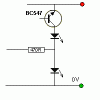I have a question about how to control 2 LED's with only 1 ground output from a Micro.
I need the ability to turn 1 LED off while I turn on the second LED with the ground output from the Mirco.
Its like a basic blinker circuit, neither LED can be on at the same time.
The output from the control device is Ground with 250mA.
thanks
I need the ability to turn 1 LED off while I turn on the second LED with the ground output from the Mirco.
Its like a basic blinker circuit, neither LED can be on at the same time.
The output from the control device is Ground with 250mA.
thanks




